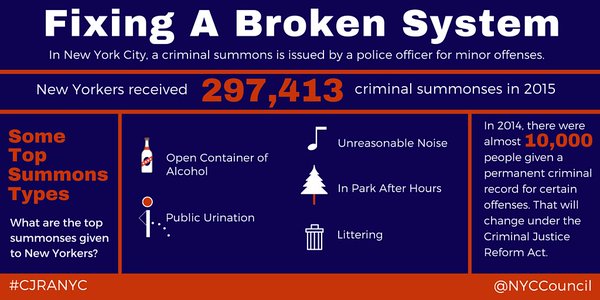A legacy of institutional racism has tainted our criminal justice system and disproportionately affected generations of African-American and Latino families. The Council is committed to enacting laws that will introduce and reinforce smart, fair and humane alternatives to criminalization.
Report after report has shown that Rikers Island is broken. In 2016, the Speaker and Council initiated the Independent Commission on New York City Criminal Justice and Incarceration Reform. Led by former New York State Chief Judge Jonathan Lippman, this Commission is rethinking the use of city jails and the land on Rikers Island, examining how to significantly reduce the pre-trial incarceration population at Rikers, and exploring the possibility of housing pre-trial detainees in community-based facilities.
The NYC Department of Correction (DOC) began housing pre-trial detainees in departmental uniforms in 2015, but did not establish systems sufficient to ensure that inmates could appear in civilian clothing at legal proceedings, leaving them at risk of prejudice and compromising the integrity of the judicial process. These individuals were also often released from courthouse facilities in DOC uniforms. In response, the Council passed a law that requires the DOC to produce and release these inmates in civilian clothing. This bill was coupled with a measure that requires the DOC to produce inmates who have multiple open criminal cases for all criminal court appearances, avoiding thousands of unnecessary warrants from being issued every year.
The United States Department of Justice found a “culture of violence” in our city’s correction facilities, and a federal monitor is now overseeing numerous systemic changes to them. This monitor, however, is only temporary, so the Council established an Inspector General for the DOC to ensure strong and permanent oversight over the DOC.

The NYPD issues almost 400,000 criminal summonses each year for low-level, quality-of-life offenses. These carry the possibility of a permanent criminal record for minor offenses and generate over 1.5 million active warrants for failure to appear in court. The Criminal Justice Reform Act (CJRA), passed by the Council in May, creates a more proportional, just system of enforcing low-level, non-violent offenses by diverting many such offenses to civil court instead of criminal court. The CJRA is projected to divert over 100,000 cases from criminal court, save close to 10,000 people from having a permanent criminal record, and avoid the issuance of over 50,000 warrants each year.
As part of the Fiscal 2017 Preliminary Budget response, the Council urged the Administration to fully fund the budget needs of the City’s five district attorneys. As a result, the district attorneys received a collective increase of $21.8 million that will support several new initiatives and adequately fund core work, including the creation of an Alternatives to Incarceration Unit and resources to reduce gun-related and other violent crimes. The increase in funding will allow the district attorneys to ensure that our laws are being enforced efficiently and fairly with swift and effective methods.
The Council passed a number of laws to safeguard inmates in the City’s jail system, including requiring the DOC to evaluate the programs it uses, report on incidences of violence, mentally ill inmates and recidivism, and provide trauma-informed care to persons who are incarcerated.
In 2016, the Council allocated $600,000 for expanding a video visitation program with the City’s three library systems to provide free live video services for families who wish to visit with their incarcerated loved ones. This program will not only decrease the burden on families in our city, but may also help reduce recidivism. This video visitation is offered at 22 public library branches across all the boroughs.
The DOC runs a nursery program on Rikers Island for recent mothers to be housed with their newborn children, a program that has historically been underused. The Council passed a bill establishing formal procedures for admission into the nursery, including establishing an appeals process, as well as requiring comprehensive reporting related to the use of the nursery, to ensure that incarcerated mothers entitled to care for their newborn children are not impermissibly denied entry.
